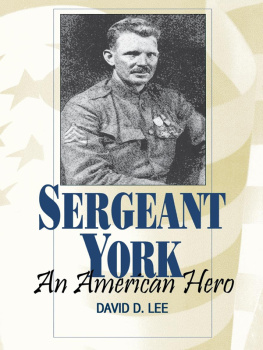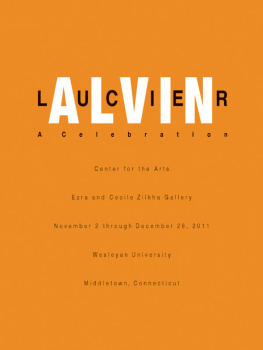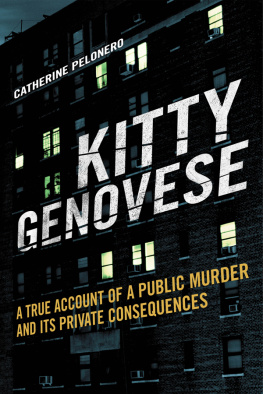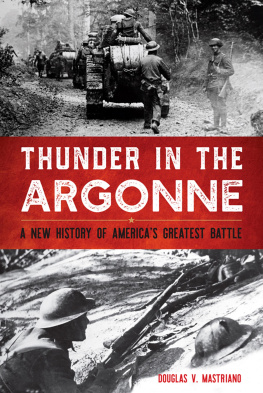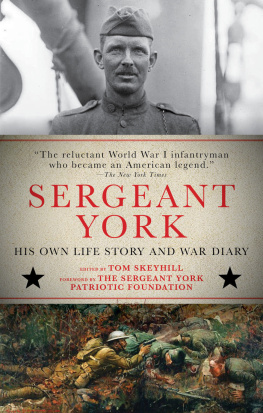
Sergeant York
Sergeant York
AN AMERICAN HERO
David D. Lee
THE UNIVERSITY PRESS OF KENTUCKY
Publication of this volume was made possible in part by a grant from the National Endowment for the Humanities.
Copyright 1985 by The University Press of Kentucky
Scholarly publisher for the Commonwealth,
serving Bellarmine University, Berea College, Centre College of Kentucky,
Eastern Kentucky University, The Filson Historical Society, Georgetown College,
Kentucky Historical Society, Kentucky State
University, Morehead State University, Murray State University, Northern Kentucky University, Transylvania
University, University of Kentucky, University of Louisville, and Western
Kentucky University.
All rights reserved.
Editorial and Sales Offices: The University Press of Kentucky 663 South Limestone Street, Lexington, Kentucky 40508-4008 www.kentuckypress.com
11 10 7 6 5 4
Library of Congress Cataloging-in-Publication Data
Lee, David D., 1948
Sergeant York: an American hero.
Bibliography: p.
Includes index.
1. York, Alvin Cullum, 18871964. 2. SoldiersUnited StatesBiography.
I. Title.
U53.Y67L44 1985 355.00924 [B] 84-10465
ISBN-10: 0-8131-1517-5 (hardcover : alk. paper)
ISBN-10: 0-8131-9028-2 (pbk. : alk. paper)
ISBN-13: 978-0-8131-9028-0 (pbk. : alk. paper)
This book is printed on acid-free recycled paper meeting the requirements of the American National Standard for Permanence in Paper for Printed Library Materials.

Manufactured in the United States of America.

| Member of the Association of American University Presses |
For Laura
Contents
Preface
In the last days of Americas first war in Europe, Corporal Alvin C. York came marching out of the Argonne Forest with 132 German prisoners and a tale of individual daring unsurpassed in the nations military annals. One of the least likely heroes in our history, York was initially a conscientious objector who was drafted only after his pleas for a deferment on religious grounds were rejected. However, his army superiors persuaded him that America was fighting Gods battle in World War I, an argument that transformed the pacifist from the Tennessee mountains into a veritable soldier of the Lord. During the final Allied offensive of the war, York singlehandedly outshot an entire German machine gun battalion, killing twenty-five men in the process. His explanation that God had been with him during the fight meshed neatly with the popular attitude that American involvement in the war truly was a holy crusade, and he returned to the United States in the spring of 1919 amid a tumultuous public welcome and a flood of business offers from people eager to capitalize on the soldiers reputation. In spite of these lucrative opportunities, York decided to return to his native hamlet, where he spent the rest of his life working to bring schools and other public services to his mountain neighbors.
Yorks value as a symbol went far beyond his contribution as a citizen or soldier. He came to prominence at a time when the United States was reeling from the impact of the Industrial Revolution, a profound social and economic force that had changed a nation of agricultural villages into a great world power. In such uncertain times, Yorks pioneer-like skill with a rifle, homespun manner, and fundamentalist piety endeared him to millions of Americans as a kind of contemporary ancestor fresh from the backwoods of Appalachia. As such, he seemed to affirm that the traditional virtues of agrarian America still had meaning in the new era. Furthermore, Yorks victory over what was then the most deadly emblem of the machine age, the machine gun, represented for many the final supremacy of man over the instruments of destruction he had created. Thus, both Yorks personality and his achievement were balm for the anxieties that gripped American society in the troubled months after the Armistice.
York kept his hold on the affection of the American people for nearly half a century because he represented not what Americans were but what they wanted to think they were. He lived in one of the most rural parts of the country at a time when a majority of Americans lived in cities; he rejected riches at a time when the tenor of the nation was crassly commercial; he was pious at a time when secularism was on the rise. Consequently, for millions of Americans, York was the incarnation of their romanticized understanding of the nations past when men and women supposedly lived plainer, sterner, and more virtuous lives. Ironically, while York endured as a symbol of an older America, he spent most of his adult life working to bring roads, schools, and industrial development to the mountains, the kinds of changes that were destroying the society he had come to represent.
Also, York caught within himself certain basic contradictions in the American character, most notably an ambiguous attitude toward violence. Although Americans insist they are a peace-loving people, violence has played a major role in shaping their history, and violent men from Jesse James to Theodore Roosevelt are heroic figures to many. The First World War highlighted these divergent feelings because, while the United States entered the conflict reluctantly, the nation fought with xenophobic zeal once Congress had declared war. As a conscientious objector turned successful soldier, York was a perfect reflection of Americas reluctant but forceful involvement in European affairs. York resolved the conflict between his religious principles and his military commitment by deciding that to fight in a noble cause was to do the Lords work, and his achievement on the battlefield apparently confirmed that America was indeed supporting a just cause in the remote and little-understood struggle in Europe.
I have had two objectives in mind in preparing this study. First of all, I have tried to penetrate the myth surrounding York to establish the facts of his life. What follows then is in part a biography that attempts to analyze the man and his achievements. Secondly, I am interested in the hero-making process itself; specifically, how heroes are chosen, the characteristics heroes exhibit, and the role institutions play in publicizing them. Closely related to this, of course, is the question of how heroes in turn manipulate the process that created them. In the case of Sergeant York, the press, Hollywood, and the army created a popular legend around York that presented him as the embodiment of certain values, but York in turn used the legend to advance his program of progress for his native Appalachian mountains once he had returned to civilian life. Although the wide acclaim he received greatly affected his life, his tenacious commitment to simple concerns enabled him to translate personal glory into a life of community service. Consequently, he claimed a special place in the hearts of his countrymen as a man whose life demonstrated the continuing vitality of the simple virtues of the common man.
Any attempt to study the life of Alvin York is plagued by some special problems. For one thing, York did very little of his own writing. Poorly educated and rather indifferent to popular acclaim, he was content to let friends express his point of view in prose more polished than his own. Three of the major sources for Yorks lifehis autobiography, his lectures, and his correspondenceare all products of other hands even though his name is affixed to each of them. Two men in particular served as Yorks scribes. Professional writer Thomas Skeyhill collaborated with the sergeant to produce Yorks autobiography in 1928, but Yorks personal secretary, Arthur S. Bushing, played an even larger role in this regard. Throughout most of Yorks public life, Bushing prepared virtually all Yorks correspondence, and he probably wrote his lectures and speeches as well. Ironically, Skeyhill and Bushing tended to express York in very different ways. Skeyhill sought to convey the flavor of Appalachian speech by presenting the autobiography in dialect, while Bushing salted his work with words and phrases that were probably unfamiliar to York. Despite the disparity of style, however, they both worked so closely with York that it is still reasonable to assume they were accurately voicing Yorks sentiments.
Next page
